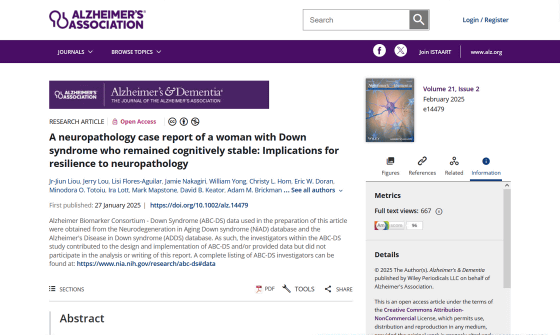A case of a woman with Down's syndrome whose brain showed signs of Alzheimer's disease but whose cognitive function did not decline is reported

A neuropathology case report of a woman with Down syndrome who remained cognitively stable: Implications for resilience to neuropathology - Liou - 2025 - Alzheimer's & Dementia - Wiley Online Library
https://alz-journals.onlinelibrary.wiley.com/doi/10.1002/alz.14479

An Unexpected Insight into Alzheimer's Disease
https://news.engineering.pitt.edu/an-unexpected-insight-into-alzheimers-disease/
Woman With Down Syndrome Had Alzheimer's Without Dementia in Surprise Case : ScienceAlert
https://www.sciencealert.com/woman-with-down-syndrome-had-alzheimers-without-dementia-in-surprise-case
Down's syndrome is the most common chromosomal disorder, and is known to cause low muscle tone, congenital abnormalities in the heart and digestive system in many cases, and characteristic facial features. Children with Down's syndrome also have a low average IQ of 50, and often experience developmental delays in motor and language skills.
People with Down's syndrome are said to be more susceptible to developing dementia after the age of 40, and by the time they reach their 60s, 90% of them have mild cognitive decline or complete dementia. However, a woman with Down's syndrome who was participating in the Alzheimer Biomarker Consortium - Down syndrome Research Study (ABC-DS), a consortium established to investigate the relationship between Down's syndrome and Alzheimer's disease, showed no cognitive decline despite being in her 60s.
Although the woman's IQ was below average (69), she performed consistently on cognitive tests over the 10 years she was in the ABC-DS. She also maintained her functional abilities, cooking and shopping for herself.

However, analysis of
In addition, a research team from the University of California, Irvine and the University of Pittsburgh who received the woman's brain after her death used a high-resolution MRI scanner to image the brain and found that it also had the accumulation of amyloid beta, which is indicative of Alzheimer's disease.
'All the clinical evaluations we've done before she passed away have shown her to be cognitively stable, which is why this case is so interesting,' said Jr.-Jiun Liou, a neurologist at the University of Pittsburgh and a researcher in the ABC-DS study.

The woman's cognitive function may have been preserved because she was educated in a private school licensed to teach students with intellectual disabilities throughout her childhood and adolescence. It has also been suggested that her physiology may have made her resistant to the neurodegeneration associated with Alzheimer's disease, and that the size of her brain tissue may have delayed cognitive decline. Another possibility is that she had a 'mosaic' form of Down's syndrome, in which not every cell in her body has three copies of chromosome 21, but some cells have two copies of chromosome 21.
'If we can identify the genetic underpinnings and lifestyle factors that allowed her brain to function well despite her disease, we may be able to discover strategies that can help other people,' said study co-author Elizabeth Head, a neuroscientist at the University of California, Irvine. 'This study shows how big a discovery can be from just one person.'
Related Posts:
in Science, Posted by log1h_ik







